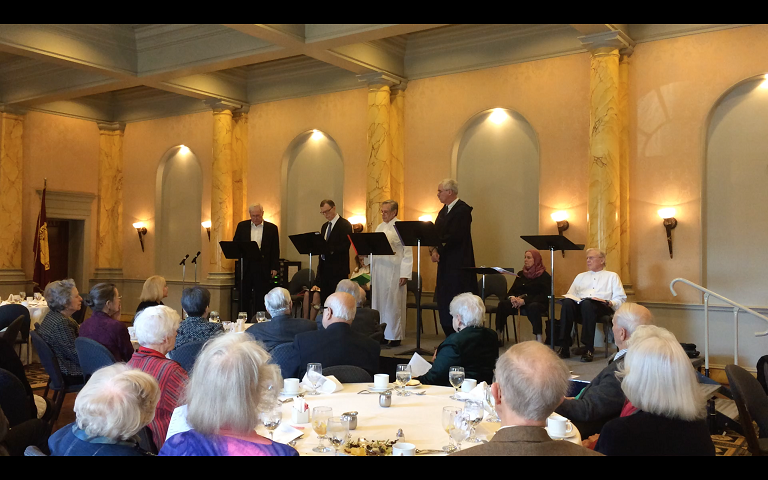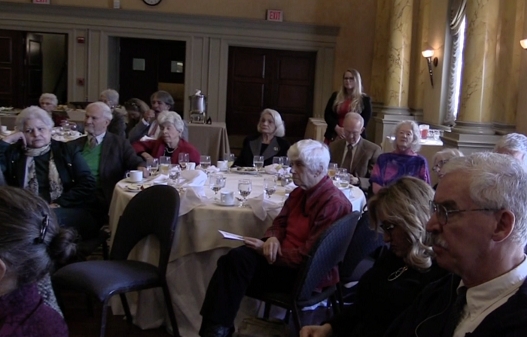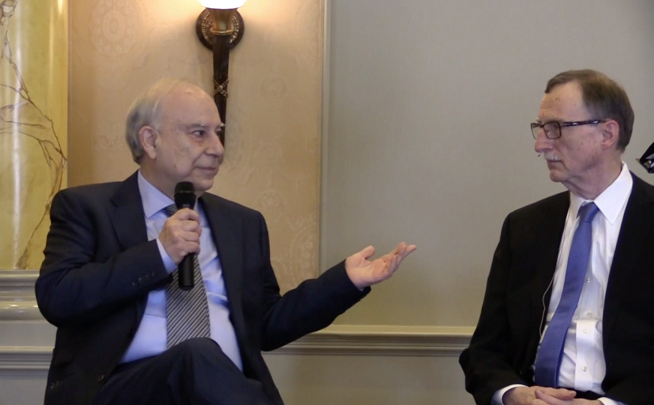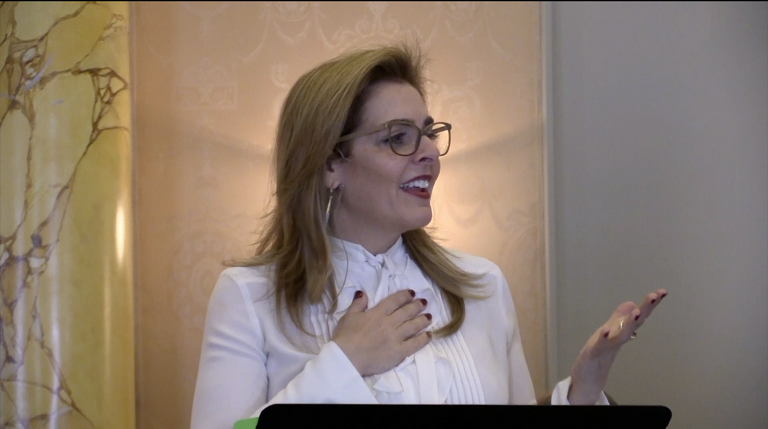Stage Reading of Noor in Washington
By Dr Akbar Ahmed
American University
Washington, DC

Cosmos Club members and their guests actively watch a stage reading of Ambassador Akbar Ahmed's play Noor
It would be safe to assume that at a time in the United States when Muslims are openly assaulted and abused, mosques attacked and a ‘Muslim’ travel ban issued, a stage reading of a play written by a Muslim, about a Muslim family, in a Muslim land, which begins with the azaan, and depicts Muslims with empathy would receive a frosty reception. So widespread is the Islamophobia that it hasn’t even spared the Indian-American community. It has also triggered a virulent strain of anti-Semitism with multiple Jewish cemeteries desecrated.
However, this was not the case when there was a stage reading of my play Noor at the Cosmos Club in Washington, DC on March 18, 2017.
The venue itself was interesting. The club, which is a private social platform for people who are distinguished in a variety of professions, is an institution itself in the nation’s capital. Members have included three former US Presidents, one former Secretary of State, two former Vice Presidents, 12 Supreme Court justices, 36 Nobel Prize winners, 61 Pulitzer Prize Winners and 55 Presidential Medal of Freedom recipients. It was an honor for Noor to be played there.
When I was informed that the Cosmos had selected Noor, which had been performed at several venues since its 2007 premiere, I was naturally curious but also pleased. The reason is that I have been on a mission to do all I can in my own limited way to help the West and the Muslim world understand each other better through building bridges.

The audience participants in a question-and-answer session with the playwright Akber Ahmed
But I was curious as to how an all-white, non- Muslim cast of Noor would get into character and how the all-white, non-Muslim audience would respond. There’s a huge gap of understanding between the two communities, creating a desperate need to build bridges. My strategy has been multifaceted that included books, documentaries, lectures, poetry, and plays. This play has been one basic platform for fostering the necessary understanding. In writing this play, I aspired to demonstrate the Americans that Muslims are far from a monolith; instead, Muslim perspectives are incredibly diverse, even within an individual family as portrayed by the three brothers in this play.
Noor can be understood on several levels: it is a parable of our times, a metaphor of hope in a time of darkness and straight-forward drama. The story in Noor portrays 24 hours in a Muslim family’s life after the abduction of a young woman named Noor and her brother Ali by soldiers of an ambiguous origin. Ali is released by the soldiers and returns home to recount the abduction to his worried brothers, but his brothers attempt to keep the abduction a secret from their father as they are concerned about his health.
The brothers debate the best response to Noor’s abduction, each representing an interpretation of Islam: Abdullah, a teacher and Sufi mystic, responds by seeking guidance from his Sheikh and turning to prayer; Daoud, a doctor who understood Islam as a literalist, responds with anger, blames the American ‘crusaders’, and advocates revenge through violence; and Ali, a modernist lawyer, responds by attempting to locate his sister with the support of the local government and officials in the Ministry of Justice. When soldiers appear at the family’s home, in search of evidence against Noor, the father realizes that his sons have been misleading him about Noor’s whereabouts and demands for truth. Upon hearing Ali’s account of the abduction, the father becomes frustrated by how little information the brothers have gathered about their sister’s disappearance. In response, the brothers leave for pursuing their individual plans in locating her – all with little success.
The next day, aunty Fatima, the mother of Noor’s fiancé, Rahman, appears to call off the engagement after hearing about her capture, due to fear that her ‘honor’ has been compromised. The brothers attempt to defend Noor’s honor and remind aunty Fatima that Noor loves Rahman, but she refuses to take their arguments into consideration and demands that the ring be returned before she storms out of the house.

Brain Doyle, who played Ali, moderates the question-and-answer session with Akber Ahmed
Noor is ultimately released by the soldiers and finds her way home thanks to a kind truck driver. Upon her return, she is adamant that she remains honorable and reminds her brothers of the complexity of women’s role in Islam and of the importance of compassion and fighting for justice against all odds. Noor is a beautiful name of God in Islam and means light; it is a metaphor for all that is good and positive and compassionate.
I need not have worried about the excellence of the acting and the response of the audience. The performance was moving and the enthusiasm of the audience palpable. Performers and audience members alike were generous in their praise of Noor, calling it ‘exceedingly moving’, noting that they ‘would like to see it again’, and expressing appreciation for the play’s capacity to provide insights into the Muslim world.
I was particularly touched to see that Kate Scharff, who played Noor, had memorized a Rumi poem at the end of the play. Reflecting on the rehearsal process, she said, ‘I’ve done that Rumi poem so many times in my car, during rehearsals, just talking to myself getting ready for work. Sometimes I find I am weeping, other times I am quite angry, I think where I’ve landed and more I think where the playwright probably intended, which is that she represents the light, the way, and has come to a more peaceful place.’
Richard Waugaman, who played Abdullah, remarked, ‘The conditions of the play both within the family and in the wider society challenge all of us, they challenge the beliefs and assumptions and ideals of all of us in the family, so I think it’s very realistic what that family is experiencing.’ I was touched by the play’s reviews received from the veteran Hugh Hill, who both directed the performance and played the father. He found the script, ‘very dense…where every line and every speech has significance and meaning and contributes to the play.’ A member of the audience began to tear up when she observed after the reading, ‘There was one line in your play that each time I heard it, I felt that it was so haunting… Ali says it, ‘I didn’t even know who they were. They could have been anybody. They could have been us.’ And I feel that that is your message, that all of us have a place and a part.’

Kate Scharff recites a poem by Rumi as her character Noor
Dr William Kennedy Smith, my guest and the nephew of the late US President John F. Kennedy, summed up the essence of the event: ‘I think the play is a great convener for a discussion that is overlooked and overdue about how we connect with people who are different from us in a way that leads to better and more constructive outcomes. And it seems that there is a feedback cycle between violence and misunderstandings that the professor is really trying to cut through.’
Noor had brought people together. The curiosity and humanity displayed by this thoughtful and distinguished group gives me hope in the capacity for building bridges even in these difficult times. One of the last lines in the play is, ‘Noor will prevail.’
(Akbar Ahmed is the Ibn Khaldun Chair of Islamic Studies at American University in Washington, DC and the author of The Thistle and the Drone: How America’s War on Terror Became a Global War on Tribal Islam and the forthcoming Journey into Europe: Islam, Immigration, and Identity)
-----------------------------------------------------------------------------

